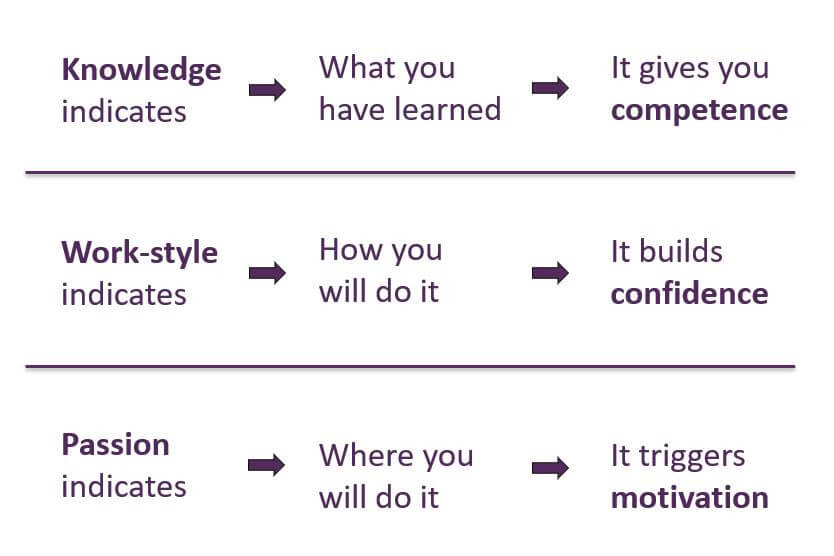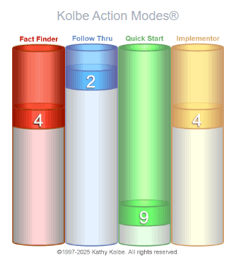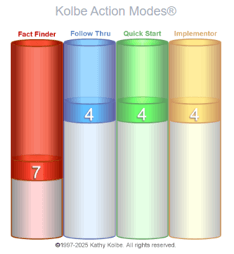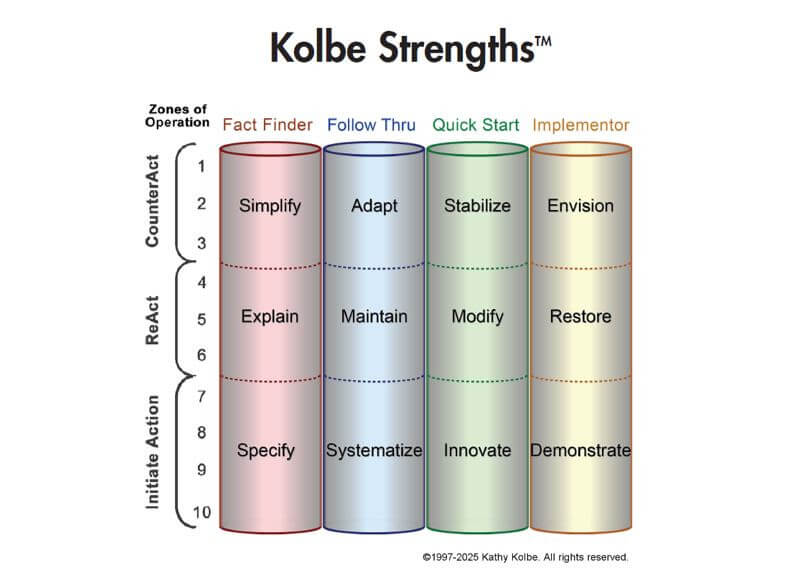As a client, Connie taught me so much. I am forever grateful she came into my life during the very first years of PSG. I have shared with others many times how she refined me and made me a better consultant and coach.
Once, we were discussing an upcoming project where she wanted to introduce the full suite of Kolbe Indexes to a proposed group. (Kolbe A™, Kolbe B™ and Kolbe C™). We always started our discussion with, “what is your objective—what do you want them to learn—what will be different?”

She said, “Mari, this is about building their confidence. We want each program manager to realize they have been chosen for this change engagement because of the specific talents they have. We want them to understand that their unique strengths are required, and an absolute must to make the project they will be leading successful. When they are sitting on the bench and not engaged in a program while others are, they will know it is intentional on our part to get them the assignment that is completely right for them.”
Confidence Begins with Becoming More Self-Aware
It is a feeling of self-assurance arising from the belief in your own abilities. But this self-belief also needs to be fostered through acknowledgement and affirmation from others. When someone has confidence in you, it means you can be trusted. You are reliable. These affirmations directly influence everything that surrounds a person and triggers a feeling of wellbeing. We must be surrounded by people who respect and admire us and can remind us of all the unique gifts we have to offer. We all have something valuable to share.

Years ago, management thinking was backwards. The adage at the time was, “reward what you want repeated.” Leaders envisioned the qualities and capabilities of an ideal employee, then rewarded employees when they evinced these traits. The idea was mostly to get a team member to improve in one or more areas of behavior. However, to build confidence, we want to reward what we know to be an employee’s natural strength.

Acknowledge and Amplify Strengths to Build Team Confidence
Here is an excellent example that was shared with me by a long-time client about her daughter. Her daughter was involved in an ERP implementation in her role. This is what the daughter’s manager had to say. “Katie, you have an incredible gift of listening and cutting through all the chaos and quickly distilling the conversation into the one question we need to answer in order to move forward.” Katie has a natural gift as a 3 in Fact Finder. This indicates she has a strength to Simplify. In this instance, her manager acknowledged and reinforced her strength to get to the heart of the matter, see the essence of the issue, understand how to simplify the problem, and forge toward the bottom line.

Mari’s Strength: Explain
Let’s say someone has the strength to Explain, like me. I have a 4 in Fact Finder. It would be music to my ears if someone said, “Mari, we can always look to you to explain just the level of detail necessary to help us identify what’s important so we can make an informed decision.
Mary Catherine’s Strength: Specify
My associate, Mary Catherine, has the strength to Specify. She has a 7 in Fact Finder. Often, I say to her, “you have an incredible gift to take that discussion we just had and put it into writing. That document you created triggers our priorities and details precisely what we need to do.


With those examples, you have just learned some of the coaching techniques across the full continuum of the Fact Finder Action Mode®. There are specific Kolbe Coaching™ Reports available for each person you lead and manage.
Connect with us if you would like to learn more and have some valuable language at your fingertips.
Introducing Imposter Syndrome
You may be familiar with the term “Imposter Syndrome.” The term, first used in a 1978 American psychology article, is today commonly understood to be a false and sometimes crippling belief that one’s successes are the product of luck or fraud rather than skill. It can be easy to fall into the trap of thinking you are not as capable as everyone perceives you to be. However, self-belief grows with acknowledgement and affirmation from others. People who feel supported by others will demonstrate confidence. Face it, as leaders we don’t often get affirmation from those around us. Seek out that affirmation from within your circles or networks.
Managers Foster and Reinforce Confidence
If you need to build confidence in your team members, it will require change. Employees need to feel a sense of acceptance and relevance. Managers need to know, acknowledge, reinforce and utilize their team members’ strengths. Employees also need to change their behavior. When employees stay silent, they miss out on chances to solve problems, influence important decisions, and build up their credibility. Playing it safe is a booby prize. It hampers growth and advancement, hurts collaboration, engagement, and job satisfaction.
When employees know their true talents, they will make decisions and complete their tasks based on their own resourcefulness.
When managers acknowledge these talents either publicly or privately, employees will feel accepted, validated, and relevant.
When managers reinforce these talents by putting them on repeated projects that emphasize their strengths, employees will deepen their understanding of alignment to assignments.
When managers utilize these strengths by intentionally putting team members together with others, they raise the bar of the end work product.

Increase Each Employee’s Confidence
My deepest gratitude to Connie Remenschneider, who challenged and refined me in my early years when I was just cutting my teeth and building expertise. She invited me to work with 198 team members within First of America Bank, and then later with 23 Transformation Program Managers within Hewlett Packard that she led. To read more about that project in Connie’s own words, click here.
It just makes sense that a manager would work to increase confidence in each of their employees. The more a team member is recognized positively for their strengths, the less negativity you will need to address. Confident employees help your organization win.
